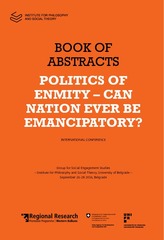Sisterhood in dispossession: the case of Serbia and Kosovo
2016
Аутори
Zaharijević, Adriana
Остала ауторства
Petrović-Trifunović, TamaraPudar Draško, Gazela

Pavlović, Aleksandar

Конференцијски прилог (Објављена верзија)

Метаподаци
Приказ свих података о документуАпстракт
The paper considers the possibility of establishing and maintaining alternative communities, taking as an example the Women’s Peace Coalition between Kosovo Women Network and the Serbian Women in Black network. The principal question put forward is whether communities that surpass identitarian belonging are possible, and how these communities relate to “communities” determined territorially, nationally (by a nation state), as well as how they relate to artificial and symbolic supranational bodies. The main aim is the examination of the political potential of a community that wishes to be grounded on the logic of peace and the rejection of the logic of possession (following the slogan “people, not territories”). A community of women activists in the shape of the Women’s Peace Coalition is defined as a community of the dispossessed, a term developed following the work of Judith Butler and Athena Athanasiou. This pregnant philosophical concept is introduced in order to offer a new approac...h to the context of an ambivalent, divided, inoperative state, with long-festering wounds of war.
Кључне речи:
Kosovo / Serbia / women activisim / alternative communitiesИзвор:
Politics of Enmity - Can Nation ever Be Emancipatory?, 2016Издавач:
- Belgrade : Institute for Philosophy and Social Theory, University of Belgrade
Колекције
Институција/група
IFDTTY - CONF AU - Zaharijević, Adriana PY - 2016 UR - http://rifdt.instifdt.bg.ac.rs/123456789/1413 AB - The paper considers the possibility of establishing and maintaining alternative communities, taking as an example the Women’s Peace Coalition between Kosovo Women Network and the Serbian Women in Black network. The principal question put forward is whether communities that surpass identitarian belonging are possible, and how these communities relate to “communities” determined territorially, nationally (by a nation state), as well as how they relate to artificial and symbolic supranational bodies. The main aim is the examination of the political potential of a community that wishes to be grounded on the logic of peace and the rejection of the logic of possession (following the slogan “people, not territories”). A community of women activists in the shape of the Women’s Peace Coalition is defined as a community of the dispossessed, a term developed following the work of Judith Butler and Athena Athanasiou. This pregnant philosophical concept is introduced in order to offer a new approach to the context of an ambivalent, divided, inoperative state, with long-festering wounds of war. PB - Belgrade : Institute for Philosophy and Social Theory, University of Belgrade C3 - Politics of Enmity - Can Nation ever Be Emancipatory? T1 - Sisterhood in dispossession: the case of Serbia and Kosovo UR - https://hdl.handle.net/21.15107/rcub_rifdt_1413 ER -
@conference{
author = "Zaharijević, Adriana",
year = "2016",
abstract = "The paper considers the possibility of establishing and maintaining alternative communities, taking as an example the Women’s Peace Coalition between Kosovo Women Network and the Serbian Women in Black network. The principal question put forward is whether communities that surpass identitarian belonging are possible, and how these communities relate to “communities” determined territorially, nationally (by a nation state), as well as how they relate to artificial and symbolic supranational bodies. The main aim is the examination of the political potential of a community that wishes to be grounded on the logic of peace and the rejection of the logic of possession (following the slogan “people, not territories”). A community of women activists in the shape of the Women’s Peace Coalition is defined as a community of the dispossessed, a term developed following the work of Judith Butler and Athena Athanasiou. This pregnant philosophical concept is introduced in order to offer a new approach to the context of an ambivalent, divided, inoperative state, with long-festering wounds of war.",
publisher = "Belgrade : Institute for Philosophy and Social Theory, University of Belgrade",
journal = "Politics of Enmity - Can Nation ever Be Emancipatory?",
title = "Sisterhood in dispossession: the case of Serbia and Kosovo",
url = "https://hdl.handle.net/21.15107/rcub_rifdt_1413"
}
Zaharijević, A.. (2016). Sisterhood in dispossession: the case of Serbia and Kosovo. in Politics of Enmity - Can Nation ever Be Emancipatory? Belgrade : Institute for Philosophy and Social Theory, University of Belgrade.. https://hdl.handle.net/21.15107/rcub_rifdt_1413
Zaharijević A. Sisterhood in dispossession: the case of Serbia and Kosovo. in Politics of Enmity - Can Nation ever Be Emancipatory?. 2016;. https://hdl.handle.net/21.15107/rcub_rifdt_1413 .
Zaharijević, Adriana, "Sisterhood in dispossession: the case of Serbia and Kosovo" in Politics of Enmity - Can Nation ever Be Emancipatory? (2016), https://hdl.handle.net/21.15107/rcub_rifdt_1413 .

